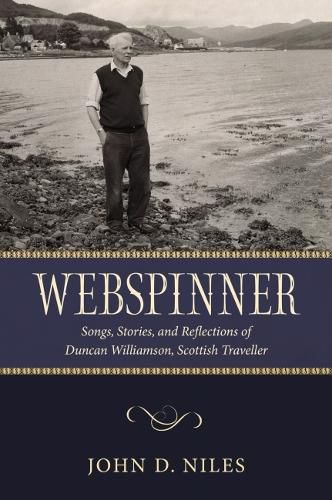Readings Newsletter
Become a Readings Member to make your shopping experience even easier.
Sign in or sign up for free!
You’re not far away from qualifying for FREE standard shipping within Australia
You’ve qualified for FREE standard shipping within Australia
The cart is loading…






This title is printed to order. This book may have been self-published. If so, we cannot guarantee the quality of the content. In the main most books will have gone through the editing process however some may not. We therefore suggest that you be aware of this before ordering this book. If in doubt check either the author or publisher’s details as we are unable to accept any returns unless they are faulty. Please contact us if you have any questions.
Born in 1928 in a tent on the shore of Loch Fyne, Argyll, Duncan Williamson (d. 2007) eventually came to be recognized as one of the foremost storytellers in Scotland and the world. Webspinner: Songs, Stories, and Reflections of Duncan Williamson, Scottish Traveller is based on more than a hundred hours of tape-recorded interviews undertaken with him in the 1980s. Williamson tells of his birth and upbringing in the west of Scotland, his family background as one of Scotland’s seminomadic travelling people, his varied work experiences after setting out from home at about age fifteen, and the challenges he later faced while raising a family of his own, living on the road for half the year.
The recordings on which the book is based were made by John D. Niles, who was then an associate professor at the University of California, Berkeley. Niles has transcribed selections from his field tapes with scrupulous accuracy, arranging them alongside commentary, photos, and other scholarly aids, making this priceless self-portrait of a brilliant storyteller available to the public. The result is a delight to read. It is also a mine of information concerning a vanished way of life and the place of singing and storytelling in Traveller culture. In chapters that feature many colorful anecdotes and that mirror the spontaneity of oral delivery, readers learn much about how Williamson and other members of his persecuted minority had the resourcefulness to make a living on the outskirts of society, owning very little in the way of material goods but sustained by a rich oral heritage.
$9.00 standard shipping within Australia
FREE standard shipping within Australia for orders over $100.00
Express & International shipping calculated at checkout
This title is printed to order. This book may have been self-published. If so, we cannot guarantee the quality of the content. In the main most books will have gone through the editing process however some may not. We therefore suggest that you be aware of this before ordering this book. If in doubt check either the author or publisher’s details as we are unable to accept any returns unless they are faulty. Please contact us if you have any questions.
Born in 1928 in a tent on the shore of Loch Fyne, Argyll, Duncan Williamson (d. 2007) eventually came to be recognized as one of the foremost storytellers in Scotland and the world. Webspinner: Songs, Stories, and Reflections of Duncan Williamson, Scottish Traveller is based on more than a hundred hours of tape-recorded interviews undertaken with him in the 1980s. Williamson tells of his birth and upbringing in the west of Scotland, his family background as one of Scotland’s seminomadic travelling people, his varied work experiences after setting out from home at about age fifteen, and the challenges he later faced while raising a family of his own, living on the road for half the year.
The recordings on which the book is based were made by John D. Niles, who was then an associate professor at the University of California, Berkeley. Niles has transcribed selections from his field tapes with scrupulous accuracy, arranging them alongside commentary, photos, and other scholarly aids, making this priceless self-portrait of a brilliant storyteller available to the public. The result is a delight to read. It is also a mine of information concerning a vanished way of life and the place of singing and storytelling in Traveller culture. In chapters that feature many colorful anecdotes and that mirror the spontaneity of oral delivery, readers learn much about how Williamson and other members of his persecuted minority had the resourcefulness to make a living on the outskirts of society, owning very little in the way of material goods but sustained by a rich oral heritage.